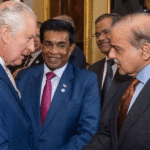In an era marked by complex geopolitical dynamics, the relationship between the United States and Pakistan remains pivotal for regional stability and security. Recently, President Joe Biden emphasized the significance of this partnership during a ceremony where Pakistan’s newly appointed Ambassador to the United States, Rizwan Saeed Sheikh, presented his credentials. This ceremony, held at Blair House, signifies more than just diplomatic formalities; it marks a renewed commitment to strengthening ties that have evolved over more than 75 years.
Historical Context of US-Pakistan Relations
The relationship between the United States and Pakistan has been shaped by historical events and strategic interests. Following Pakistan’s independence in 1947, the U.S. provided substantial economic and military assistance, particularly during the Cold War when Pakistan was seen as a critical ally against the spread of communism. This relationship deepened during the 1980s, as the U.S. supported Pakistan in its efforts against Soviet forces in Afghanistan.
However, the partnership has been fraught with challenges. The post-9/11 era brought new complexities, as the U.S. sought Pakistan’s cooperation in combating terrorism. This led to significant military and economic aid but also to tensions over issues such as Pakistan’s nuclear program and its relationship with extremist groups.
Recent Developments
In the context of contemporary global politics, President Biden’s statements reflect an understanding of the need for a stable and cooperative relationship with Pakistan. The U.S. recognizes Pakistan’s strategic position in South Asia, particularly concerning its neighboring countries, including India and Afghanistan. This strategic significance is underscored by the ongoing security threats in the region, making cooperation essential for both nations.
Key Areas of Cooperation
1. Counterterrorism Efforts
One of the primary pillars of US-Pakistan relations has been counterterrorism cooperation. The U.S. values Pakistan’s role in the fight against terrorism, especially given its geographic proximity to Afghanistan, where various extremist groups operate. President Biden’s remarks during the credentialing ceremony emphasized this point, acknowledging the importance of US-Pakistan collaboration in combating terrorist threats.
Over the years, the U.S. and Pakistan have engaged in various joint operations and intelligence-sharing initiatives aimed at dismantling terrorist networks. Pakistan has played a crucial role in efforts to combat the Taliban and other extremist organizations, often at significant costs to its own security and stability. This cooperation has been vital in ensuring not only regional security but also global safety.
2. Economic Partnership
Ambassador Rizwan Saeed Sheikh highlighted the economic relationship as a cornerstone of US-Pakistan ties. Historically, the U.S. has been a significant source of foreign direct investment in Pakistan, which has bolstered various sectors, including infrastructure, energy, and health. The ambassador pointed out that the United States remains the largest destination for Pakistani exports, which underscores the potential for further economic collaboration.
The economic partnership also includes initiatives aimed at enhancing trade. For instance, both countries can work on improving market access for Pakistani products in the U.S. while encouraging American investments in Pakistan. This relationship can be further strengthened by exploring areas such as:
- Energy: With Pakistan facing energy shortages, the U.S. can assist by investing in renewable energy projects, particularly in solar and wind energy, to help diversify Pakistan’s energy portfolio.
- Technology and Innovation: The U.S. can support Pakistan’s burgeoning tech industry through investment and collaboration in sectors like information technology and telecommunications.
- Agriculture: Agriculture is a vital sector in Pakistan’s economy. U.S. expertise in agricultural technology can be beneficial in enhancing productivity and ensuring food security.
3. Climate Change and Environmental Cooperation
President Biden’s administration has made climate change a central focus of U.S. policy. This aligns well with Pakistan’s urgent need to address environmental challenges, including floods, droughts, and rising temperatures. The effects of climate change disproportionately impact developing countries like Pakistan, making international cooperation crucial.
The concept of a “Green Alliance” between the U.S. and Pakistan could focus on joint efforts to combat climate change. This could involve:
- Investing in Renewable Energy: By supporting solar, wind, and hydroelectric projects, the U.S. can help Pakistan reduce its reliance on fossil fuels.
- Disaster Preparedness: Both countries can collaborate on improving disaster response strategies, particularly in the wake of climate-induced disasters.
- Sustainable Agriculture: Promoting sustainable farming practices can enhance food security while minimizing environmental degradation.
4. Health Security
The COVID-19 pandemic has underscored the need for robust health systems worldwide. Pakistan faces significant challenges in healthcare delivery, making U.S. support essential. Collaborative efforts can focus on:
- Vaccination Initiatives: The U.S. can assist in providing vaccines and healthcare resources to combat public health crises.
- Health Infrastructure: Investments in healthcare infrastructure can improve access to quality care for the Pakistani population.
- Research Collaboration: Joint research initiatives in health and medicine can foster innovation and improve health outcomes.
The Role of the Diaspora
The Pakistani diaspora in the United States plays a crucial role in enhancing the bilateral relationship. As one of the fastest-growing immigrant communities in the U.S., the Pakistani-American community contributes significantly to the economy and cultural exchange.
Economic Contributions
The diaspora not only sends remittances back to Pakistan, supporting families and communities but also engages in business ventures that enhance economic ties between the two countries. By investing in startups and established businesses, the Pakistani diaspora helps create jobs and stimulate economic growth in both nations.
Cultural Exchange
Cultural ties between the U.S. and Pakistan are also vital. The diaspora fosters understanding and appreciation of Pakistani culture in the United States, bridging the gap between the two nations. Cultural festivals, educational exchanges, and community events can strengthen these ties and promote goodwill.
Addressing Challenges
While the future of US-Pakistan relations holds promise, several challenges need to be addressed to ensure a sustainable partnership.
1. Regional Tensions
The geopolitical landscape of South Asia is fraught with tension, particularly between India and Pakistan. The U.S. has often been seen as a mediator in this dynamic, but navigating these relationships requires sensitivity and a nuanced understanding of regional politics. The U.S. must work to ensure that its engagement with Pakistan does not exacerbate tensions with India.
2. Domestic Political Dynamics
Both the U.S. and Pakistan face their own domestic political challenges that can impact bilateral relations. In Pakistan, political instability and economic challenges can hinder the government’s ability to engage effectively with the U.S. Conversely, shifts in U.S. domestic politics can also influence foreign policy priorities, potentially affecting the U.S.-Pakistan relationship.
3. Counterterrorism and Security
While counterterrorism cooperation is a cornerstone of the relationship, differing perspectives on security threats can create friction. The U.S. may have concerns about Pakistan’s relationships with certain groups that it perceives as threats, while Pakistan may view these relationships through a different lens. Addressing these differences openly and constructively is crucial for a harmonious partnership.
The Path Forward: A Vision for Enhanced Cooperation
As President Biden and Ambassador Sheikh look toward the future, a multifaceted approach to US-Pakistan relations is essential. This includes:
1. Structured Dialogues
Implementing regular and structured dialogues at various levels—political, economic, and cultural—can provide a platform for addressing issues and exploring opportunities. These dialogues should aim to set clear goals and benchmarks for collaboration, ensuring accountability and progress.
2. Strengthening Economic Ties
Developing comprehensive trade agreements that address tariffs, market access, and investment protection can pave the way for deeper economic ties. Initiatives such as the U.S.-Pakistan Business Council can facilitate engagement between private sectors in both countries, encouraging investment and collaboration.
3. Education and Capacity Building
Investing in education and capacity-building initiatives can empower the next generation of leaders in both countries. Scholarships, exchange programs, and collaborative research initiatives can enhance skills and knowledge, fostering long-term relationships based on shared values and objectives.
4. Addressing Global Challenges Together
In an interconnected world, tackling global challenges—such as climate change, health security, and terrorism—requires cooperation. By prioritizing joint efforts in these areas, both countries can demonstrate their commitment to addressing shared concerns and promoting regional and global stability.
Conclusion
The relationship between the United States and Pakistan is vital for regional stability and security. President Biden’s recent statements underscore the importance of this partnership, which has the potential to evolve into a robust collaboration that addresses pressing global challenges.
As both nations navigate the complexities of contemporary geopolitics, a commitment to enhancing cooperation in areas such as counterterrorism, economic engagement, climate change, and health security will be essential. By leveraging the strengths of their respective nations and fostering goodwill through cultural exchange and diaspora contributions, the U.S. and Pakistan can build a partnership that not only benefits their own citizens but also contributes to global peace and stability.
In this new chapter of US-Pakistan relations, both countries have the opportunity to redefine their engagement and work collaboratively toward a future marked by mutual respect, shared goals, and enduring friendship.
#USPakistanRelations #Biden #Diplomacy #RegionalSecurity #EconomicPartnership #ClimateChange #Counterterrorism #CulturalExchange #PakistaniDiaspora #GlobalChallenges #Geopolitics #SustainableDevelopment








